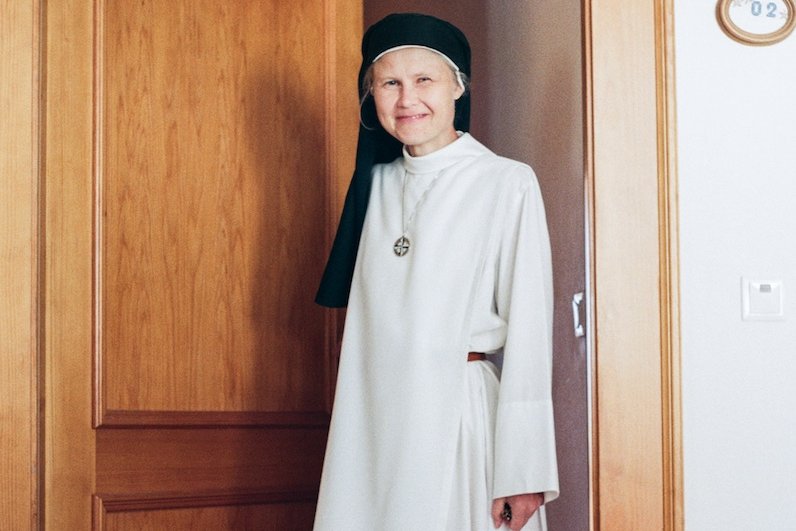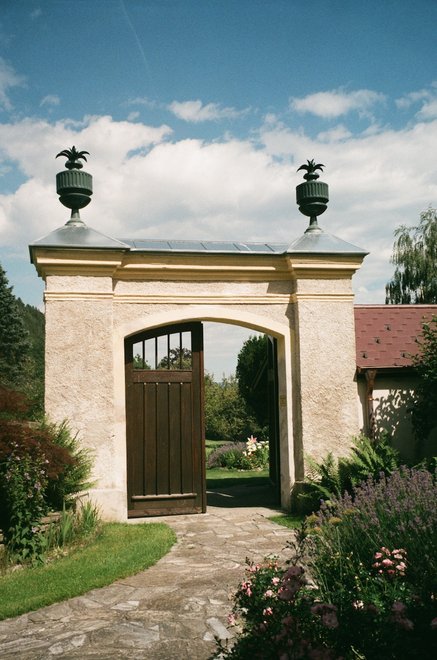“What Should People Waste? Themselves!”
Kirchberg Monastery in Lower Austria may date from centuries past, but not so the nuns who live within its thick walls. We recently spent a few days with them, observing the strict prayer times and enjoying homemade blueberry strudel. In these difficult times, we sought advice from someone who really ought to know: Nun and psychotherapist Teresa Hieslmayr. Who does the virus serve? What gives life meaning? How evil is consumerism?
“The world is a vale of tears!”
David Meran: What are the top three dumbest convent clichés?
Teresa Hieslmayr: That people in a convent people just sit around and pray, that we get money from the church, and that we’re outdated and from the last century.
Does living in a convent make you go a little stir-crazy sometimes?
I hate to disappoint you, but as a nun, I don’t spend all day sitting behind thick walls. Although I live in Kirchberg Monastery on the Wechsel, I work in two houses for the mentally ill in Vienna. I belong to the worldly community of commuters. From Monday to Wednesday I am in Vienna, where I live in another monastery, the rest of the week I spend in Lower Austria. So I don’t go stir-crazy; on the contrary, the days aren’t long enough for me. Even more so in these corona-times. My pastoral care and psychotherapy work is more urgent than ever.
Do you have a television?
No, I never watch television. We have a TV in the convent; my sisters watch it, but I don’t.
“Why does it affect some people and not others?”
You are also a psychotherapist. What transcendent questions did corona raise for you? Do you often find yourself shaking your head at the absurdity of the world out there?
Corona naturally raised many questions for me as well. Ultimately, they are the same ones that the normal absurdity of the world also raises, they are just more prominent now because people have more time to think. What is the meaning of all this, who does the virus serve, why does it affect some and not others? I personally don’t ask myself such questions any more often than I usually do, but people are increasingly asking them of me at the moment. In religious life you are always thinking about these things anyway. They are extremely present above all in psychotherapy, but also in pastoral care. Both often deal with the real nitty-gritty: How am I going to get through the next month financially? And that carries with it the existential question of all or nothing. You can feel that on an emotional level.
What does responsibility for creation mean?
That’s the theological word for environmental protection (laughs). It means treating nature and life with respect and reverence. At the moment, the coronavirus is sadly playing right into the hands of climate and environmental activists.
Do we travel too often, do we consume and buy too much?
Definitely. I always scold my colleague when he comes in to work with coffee in to-go cup. It’s simply wrong for supermarkets to offer a few pieces of pineapple packed in plastic. Selling a kilogram of pork for four euros is a sin! Not buying organic meat is ethically unacceptable in my opinion. Respect for nature and animals has been very important to us in the convent for ages. Hopefully people will now begin to realize that consumerism is an inadequate pleasure—it does not create real inner satisfaction. Shopping is not a hobby! I also participated in the “Fridays for Future” demonstrations; that was extremely important to me from a theological standpoint. If you are a believer, there is no way around this issue.
“Shopping is not a hobby.”
How can God help us?
I always ask myself: “How do people get by without God?” But what do we mean when we talk about God? For me, God is the last, highest authority, who wants absolute goodness and justice. If I can believe that everything will be good and just in the end, it makes it easier to deal with crises like this. I often quote the saying: “Everything will be good in the end, and if everything isn’t good yet, then it’s not the end yet.” Which is also to say that if I don’t know it yet, the Lord God—or the final instance—knows.
Your theory sounds comforting on the one hand, but also severe. I personally can’t see anything just in a global pandemic.
The Church used to say, and everyone laughs about it today, “The earth is a vale of tears.” Nobody dares to say this today, but de facto life is very, very hard for many people. In the western world, we’ve largely managed to find ourselves on the sunny side of life, yet every existence has its challenges, no matter where—we don’t need to kid ourselves about that. This is exactly where faith comes in and helps us to endure the mercilessness of existence—together, as a community, and to help each other.
“I also participated in the 'Fridays for Future' demonstrations.”
What is life like in the Dominican Order? What are and aren’t you allowed to do?
I’ve never asked myself that question while in the convent. We have our prayer times and we eat together. The day begins in the morning with meditation and prayer, then breakfast and work. Afterwards come lunch, midday prayer, and in the afternoon we work again. In the evening meditation, prayer and dinner—all very simple. What I am not allowed to do would probably be to buy expensive jewelry or go on a luxury trip to the Maldives, but the responsibility for creation prohibits that anyway.
“My habit is extremely impractical.”
As a nun, are you allowed to buy yourself luxury items like perfume?
I think so. Funnily enough, we get a lot of cosmetics as gifts. I’ve been given so many creams over the years! I give everything away because I don’t need it (laughs). But we are allowed to own it.
Do you always wear your habit?
No, not at all. It’s different in every community; I only wear it on liturgical, solemn occasions. When working in the garden, for example, our white habit would be extremely impractical.
Your order has three vows: poverty, celibacy, obedience. They don’t strike me as particularly appealing at first glance. Why did you decide to enter a religious order as a young woman? It means giving up so much in life: children, family, and sexuality.
I joined when I was about 30 years old, but definitely not because of the three vows. By the way, these three vows apply to all orders. We are currently in the process of finding new terms for them, because they are simply no longer true. We are not poor. Poverty may make you think of Africa, but we are certainly not a destitute convent. Most people can imagine what celibacy means, and obedience would perhaps be called mindfulness today.
Before I entered the convent, I would spend a few days at a time there. I noticed how the structure helped me to be close to God. This close relationship with God is still the greatest treasure in my life today. When I entered, I wanted to cherish this relationship, to multiply it—biblically speaking. That was my most important motivation.
“People fall in love quickly.”
Can’t a relationship with God be combined with a human relationship? Why can’t you have a family in the order?
History has shown that family orders in convents simply don’t work. If such communities are to last for generations, they need to focus fully on God. I also don’t think it works if females and males live together. People are built a certain way and fall in love quickly. That does not result in good group dynamics.
You are willing to give up family, sexuality, and a spouse?
These things are non-issues for me. I always ask myself, is it worth giving all that up for what I gain in return? The “balance” has to come out positive, otherwise it becomes problematic. The “annual balance” has to come out right for you individually. This can also change, which is why I very much welcome the idea of the temporary convent or the religious volunteer year. In these programs, you live in the convent for a certain time and check your “balance” from time to time.
What do you waste?
To some degree my time, in a positive sense. I am generous with that. I give away my strength, my lifetime, and my energy. But I do this very consciously, it’s a decision.
What should people waste?
They should waste themselves, preferably.
The term “sisterhood” is often also used in a feminist context. Are you a feminist?
I’m becoming more and more of a feminist. The masculine language in the church really gets on my nerves, for example. So do the male-dominated structures in the church, of course; it’s crazy. We nuns have a certain freedom; we formulate our prayers ourselves and don’t need a male priest to stand up in the front. When a priest comes into the house, we prefer to set the tone. Female power, I always say!
“Female power, I always say!”
What’s annoying about the convent?
Our hallways are large and cold, which is annoying—especially when you have a cold. Sometimes the sisters get on your nerves as well, but that’s obvious (laughs).
Is there anything else dear to your heart that you would like to share with our readers?
Yes, these times during and after corona challenge us to become active! Ask yourself: What is needed right now? What is my mission after this crisis? What actions would do the world good? Being informed is important, but I don’t have to study every statistic for hours. That doesn’t help anyone. It’s better to call someone who never gets calls. Just try it, sense it out, if it feels cool, then do it again!
“If it feels cool, do it again!”
So we should all act in a meaningful and positive way?
We all have a mission, theologically we call it a “calling.” Fulfilling it is much better than always having everything revolve around yourself. You can save yourself a lot of psychotherapy if you just do your job in a meaningful way.
Sister Teresa, thank you very much for the interview.












